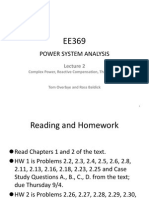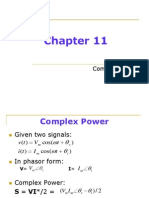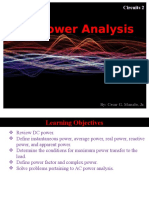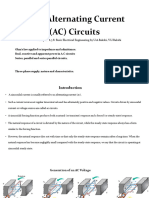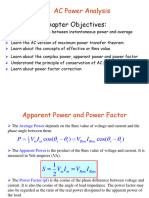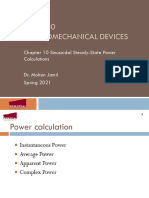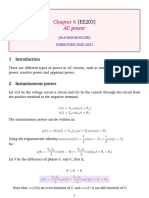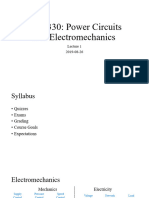8/30/2019
Schedule
• Mon 8/26: Phasors
• Wed 8/28: Complex power
ECE330: Power Circuits & Electromechanics • Fri 8/30: Power factor correction
Lecture 3. Power Factor Correction • Mon 9/2: Labor day (no class)
• Wed 9/4: Three-phase power
• Fri 9/6: Review + Quiz 1
Prof. Richard Y. Zhang
Univ. of Illinois at Urbana-Champaign
ryz@illinois.edu
1 2
1 2
From the last lecture Power Triangle
Phasors Waves
[V] Equivalence [V] Complex Power [VA]
[A] [A] Reactive Power [VAR] Imag
product product
Complex Power [VA] Instantaneous Power [W] Apparent Power [VA]
real part average Power Factor [Dimensionless] Real
Real Power [W] Equal
Average Power [W]
Lagging Real Power [W]
3 Leading 4
3 4
Today Sum of sinusoids of same frequency
Add two cosine waves of the same frequency
• Conservation of complex power
• Reactive loads and reactive power
Which trig identity? Product-sum formula?
• Power factor correction
Source: SOS math
Only valid if A = B
5 6
5 6
1
� 8/30/2019
Review: Complex numbers Review: Rotating arrow revisited
Im
Im
y Polar
(Engineer)
V V
Rectangular
θ Re Polar ωt + ϕ x(t) Re
(Mathematician)
x
x(t)
Theorem (Euler).
7 8 t
7 8
Review: Analytic representation Sum of sinusoids of same frequency
Add two cosine waves of the same frequency
Theorem.
Define phasors
Analytic representation
Real signal Analytic representation
We will use this result to add / subtract / Same frequency
differentiate / integrate sinusoids via their
phasors
10
9
9 10
Sum of sinusoids of same frequency Conservation of Complex Power
Theorem. Recall: We
Equivalent
just simply
Equivalent
add the
phasors
Equivalent
Same frequency
We just simply add the phasors
(What about subtraction?) 11 Exercise: Repeat for components in series 12
11 12
2
� 8/30/2019
Complex KCL and KVL (Memorize this slide) What does an impedance mean?
Complex voltages, currents, and impedances.
Same circuit analysis as resistor networks
IX Q = I2X
View “impedance” as “complex resistance”.
View “reactance” as “imaginary resistance”. I IR P = I2R
13 Model for arbitrary linear P-Q load 14
13 14
Hint 1: Complex Ohm’s law Hint 1: Complex Ohm’s law
Exercise 1 Exercise 1
Hint 2: Hint 2:
Load 1 is 1 + 1j Ohm. Load 1 is 1 + 1j Ohm.
What is What is
15 16
15 16
Today Reactance as an imaginary resistor
Complex
• Conservation of complex power Ohm’s law
• Reactive loads and reactive power
• Power factor correction
Used to model
Reactive
power law capacitors and
17 inductors 18
17 18
3
� 8/30/2019
Differentiation & Indefinite Integral Back to lecture 1
Trigonometric identities What is the phasor for dx/dt?
Write down the phasor for x(t)
Multiply phasor by jω
Magnitude
Trivial differentiation Must be
positive =0 =1
Differentiation = Multiply phasor by jω Multiply by j
adds 90o to
Indefinite Integration = Divide phasor by jω
19
angle 20
19 20
Reactive power of a capacitor Phasor diagram
Im Im
V Re
I θ Re
C C Q<0
Current leads voltage Reactive power
(Leading PF) supplied
Current leads
voltage by 90o
No real power
Capacitors supply
21 reactive power 22
21 22
Reactive power of an inductor Phasor diagram (Memorize this slide)
Im Im
V Re
I θ Re
L C Q<0
Current leads voltage Reactive power
(Leading PF) supplied
Current lags
Im Im
voltage by 90o
V
θ Q>0
Re
No real power L Re
I
Inductors consume
Current lags voltage Reactive power
23
reactive power (Lagging PF) consumed 24
23 24
4
� 8/30/2019
Extreme warning!! Direction of current!! Today
Im Im
V
??? Re • Conservation of complex power
• Reactive loads and reactive power
θ Re
C Q<0 • Power factor correction
I
???
Im Im
V
I
θ Q>0
Re
L Re
??? ???
Current into loads, out of sources 25 26
25 26
Conservation of Complex Power Power factor correction (Memorize this slide)
Imag
Recall: We
just simply
add the
phasors
Real
Exercise: Repeat for components in series 27 Report as: Add |Q2| VARs of capacitance 28
27 28
Exercise 2 Exercise 2
What is What is
29 30
29 30
5
� 8/30/2019
Exercise 3 Exercise 3
[VA] [VA]
What is the power factor? What is the power factor?
Q > 0 means ϕ > 0
cos ϕ = P/S
31 32
31 32
Exercise 4 Exercise 4
Compute new apparent power
[VA] [VA]
How much capacitance for How much capacitance for Compute new reactive power
Compute compensation
33 34
33 34
Schedule
• Mon 8/26: Phasors
• Wed 8/28: Complex power
• Fri 8/30: Power factor correction
• Mon 9/2: Labor day (no class)
• Wed 9/4: Three-phase power
• Fri 9/6: Review + Quiz 1
You are ready to do Homework 1
35
35










